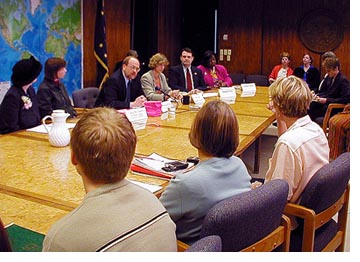 "Continued Coverage is Both Essential and Humane," says First Lady April 18. 2002
"By delaying action on repealing the sunset clause, we are playing Russian roulette with people's lives, and placing another stress on women who are already under incredible pressure," said First Lady Susan Knowles, who chaired a roundtable discussion this morning in the Governor's Conference Room. Activists Carla Williams and Jennie Hargrove with the Alaska Breast Cancer Advocacy Partners and Fran Visco with the National Breast Cancer Coalition spoke about the value of the Breast and Cervical Cancer Medicaid Treatment Program and the need to ensure that it continues. Alaska's program, which provides funds for breast and cervical cancer treatment to qualified women, began in July 2001. Since then, 38 Alaska women have received treatment in the program. That treatment has cost the state just $97,000 because the federal government pays a 70 percent share of the program. Just before approving the program last year, the State Senate placed a two-year sunset clause on the program. Unless the sunset clause is repealed, women receiving treatment when the clause takes effect in June 2003 will no longer have their treatment costs paid for. In an unusual "Sense of the House" action at the end of last session, a strong bipartisan majority voted 32-5 to oppose the sunset clause added by the Senate. Advocates are concerned that women who otherwise would seek treatment through the program will not do so as the cutoff date approaches, fearing that their treatment will be interrupted. Some legislators say that women who are under treatment as of the sunset date would continue to receive treatment. The federal Medicaid agency has clearly stated otherwise. All federal funds for the program will cease if the sunset clause takes effect - including funds for women already under treatment. Pledges to take care of those women entirely with state funds are impossible to substantiate, because one legislature cannot bind a future legislature to provide those funds. Such action would also be a inefficient use of state funds, because the state would pay the full 100 percent of treatment, as opposed to just the 30 percent match to the federal Medicaid dollars available for the program. "I've heard it said that the Legislature will repeal the sunset clause next year, so we shouldn't worry about it now," said Commissioner Jay Livey, whose Department of Health and Social Services runs the program. "If we're going to do it anyway, why wait? In the meantime, we're leaving women with breast cancer wondering whether their treatment will be cut off." Gov. Tony Knowles introduced legislation on the first day of this year's legislative session repealing the sunset clause that would cut off funding for the program. It was the first bill he introduced this year, but today, more than 90 days later, Knowles' bill has yet to receive a hearing in the Legislature. "Imagine being caught in this circumstance: you are diagnosed with breast or cervical cancer; you are eligible for Medicaid services for treatment under this new program; you are uncertain whether the treatment can be completed because the program will end," Knowles said when introducing the bill. "I can't fathom why we would want to place a woman and her loved ones in this untenable position." Knowles recently followed up with a strongly worded letter to House Speaker Brian Porter, urging Porter to bring the bill to the House floor. "When I signed into law the bill last year that allowed Alaska to offer this new Medicaid option, I pledged I would do everything possible this year to remove the sunset placed on the program," Knowles wrote. "In the interest of women's health in Alaska, I urge your prompt and favorable action on this measure." At the roundtable, cancer survivor Jennie Hargrove spoke movingly of her year long battle with cancer. "If this program had not been in effect when I was diagnosed, I would have waited to begin treatment. I now believe that waiting would have been my death sentence," she said. "First, you gave me hope; then, you helped give me my life back. Please give other women this chance, too."
Source of News Release & digital photo:
|
 A group of
breast cancer treatment advocates, minority legislators, and
health officials on Wednesday demanded that legislative leaders
pass a bill extending a state program that funds breast and cervical
cancer treatment for women. The extension would repeal a sunset
clause placed on the program that will cut off funds as of June
26, 2003.
A group of
breast cancer treatment advocates, minority legislators, and
health officials on Wednesday demanded that legislative leaders
pass a bill extending a state program that funds breast and cervical
cancer treatment for women. The extension would repeal a sunset
clause placed on the program that will cut off funds as of June
26, 2003.